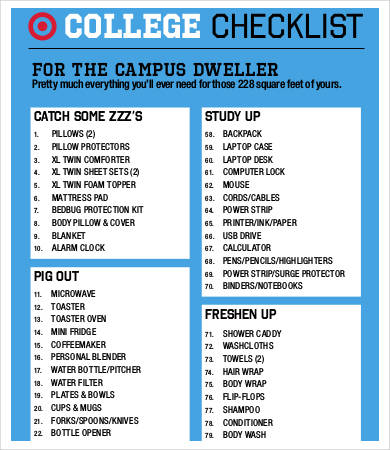

#College checklist for freshman how to
There are many things to do in the summer before college, and it can be difficult to know how to get ready. The institution is there to serve the student.Congratulations, you’re officially a college freshman! This is both an exciting and frightening transition for most students. "College is not meant to be done on your own," says Odette De Leon, an adviser at Valencia College, a community college in Orlando. If someone else says hi, reciprocate!"īe your own advocate - remember, you are the customer!Įven if you're paying with loans or a scholarship, you are paying to be a college student, so make the school work for you. I can't meet my best friend and I'm struggling in chemistry!' " Lopez says. Everyone said that college is where you're supposed to meet your best friend. "You could think, 'I'm never going to have a friend. Join clubs and organizations - let the organizational framework of those meetings ease the awkwardness of scheduling a first friend date.ĭon't beat yourself up, though, if it doesn't happen right away. Start with your classes - work on assignments together or form a study group.
#College checklist for freshman full
You can also talk about stuff that's unrelated to your class.Ĭollege is full of opportunities to meet people. You might be able to get an extension on a paper.

So what do you talk about when you go? You can bring an assignment you're struggling with, ask what's on an upcoming exam. He told her, "This is my experience, and I have never learned any of this stuff." His vulnerability was rewarded: The two of them became close, and the professor eventually became his mentor. When Lopez was struggling in a class freshman year, he went to the professor's office. "Everyone from almost every background has that fear that they got in here by accident, and that if you go in and talk to your professor, that's more and more possibility for them to discover that you're actually an idiot who got in by accident," he says. Rick Lopez, dean of new students at Amherst College, was once a terrified freshman, too. We've heard from students all over the country, and so many agree: Office hours are terrifying. They can also result in strategic career advice and networking opportunities. Research has shown that having one strong connection with an adult - staff or faculty - can make you feel engaged and supported throughout college. Anyone connected with the college who you can lean on to learn the ropes of the institution. It can be an adviser, a librarian, a financial aid officer, even an admissions counselor. Make a connection with a faculty or staff member. The best way to make sure you get this right is to meet with an adviser - which leads us to the next takeaway: If you're not taking a full course load - that may mean extra classes over the summer - or a longer timeline. How many credits will you need each semester if you want to finish in four years? The answer: 15 credits. For example, if you know you need 120 credits to graduate - do the math. Pick your classes wisely and map out your path. How To Pay For College How To Survive College When You're Paying Your Own Way


 0 kommentar(er)
0 kommentar(er)
